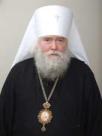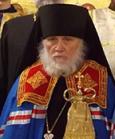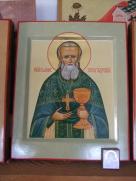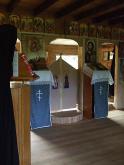Saturday, June 20, 2015
Sayings of the Desert Fathers on Humility
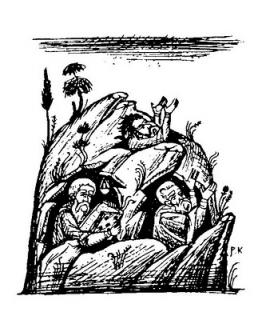 The holy fathers always condemned themselves, having a realistic view of themselves before Almighty God. We should take note of their practice, and in this way avoid the traps of the devil. The evil one always strives to distort reality, so that we would commit sin.
The holy fathers always condemned themselves, having a realistic view of themselves before Almighty God. We should take note of their practice, and in this way avoid the traps of the devil. The evil one always strives to distort reality, so that we would commit sin.
A brother asked Abba Poemen: “How is it possible for a man to avoid speaking evilly to his neighbour?” The old man answered unto him and said: “We and our brethren possess two images. Whensoever a man condemneth himself, his brother appeareth to him beautiful and excellent; but whensoever a man appeareth beautiful to himself, his brother will be found to be, in his sight, hateful and abominable”.
This warfare is of the utmost importance:
One of the old men said, “When a man saith unto his companion, “Forgive me”, and at the same time humbleth himself, the devils are consumed.
As true Orthodox Christians, we must know what is Orthodox and what is un-orthodox dogma and practice.
 However, our spiritual life must show that we also know what is virtue and what is vice - indeed, what is of God, and what is of the enemy of our salvation. In our passionate state, blinded by our love of sin and deceptive reasoning of the enemy, we can easily make a grave mistake….The following account from the Paradise of the Fathers shows how a simple mind can be deceived (and alas, we are today all very simple and unlearned, as compared with the Holy Fathers of old!) At that time, the Bishops of all the great cities were fully Orthodox, and great spiritual men. Sadly, this is not the case today. Nevertheless, we are all obligated to mistrust our own fallen reasoning to a certain extent, taking advice from our spiritual fathers. If we refuse to do this, we have accepted the mindset of protestantism, where the fallen, sinful mind of each individual is a “perfect” and “infallible” authority to itself:
However, our spiritual life must show that we also know what is virtue and what is vice - indeed, what is of God, and what is of the enemy of our salvation. In our passionate state, blinded by our love of sin and deceptive reasoning of the enemy, we can easily make a grave mistake….The following account from the Paradise of the Fathers shows how a simple mind can be deceived (and alas, we are today all very simple and unlearned, as compared with the Holy Fathers of old!) At that time, the Bishops of all the great cities were fully Orthodox, and great spiritual men. Sadly, this is not the case today. Nevertheless, we are all obligated to mistrust our own fallen reasoning to a certain extent, taking advice from our spiritual fathers. If we refuse to do this, we have accepted the mindset of protestantism, where the fallen, sinful mind of each individual is a “perfect” and “infallible” authority to itself:
There were two men who were living in the world, and were fearers of God, and they were both of the same mind, and they went forth and became monks; and when they heard in a plain manner the word of the Gospel which saith, “There are eunuchs who have made themselves eunuchs for the sake of the kingdom of heaven (Matt. 19:12), they arrived at the hottest point of their love, and they made themselves eunuchs [castrated themselves, ed. note] for the sake of the kingdom of heaven. Now when the Bishop heard [of this] he set them aside and excommunicated them. Then those men, wishing to show that they had done what was good, said unto one another, “We have made ourselves eunuchs for the sake of the kingdom of heaven, and this Bishop driveth us out! Let us go and make a complaint against him to the head of our monasteries, that is, to the Bishop of Jerusalem”; and when they had gone to him they related unto him the whole matter. Then the Bishop said unto them, “And I also set you aside and excommunicate you”; and being greatly grieved by this remark also they went to the Bishop of Antioch, and related the matter unto him, and he also drove them away with the same words. Then the two brethren said unto one another, “Let us go to the Patriarch of Rome, and he will avenge us and will take vengeance on all these [Bishops].” And having gone to the great Patriarch and Bishop of Rome, and made him to know their matter, and what the Bishop and Patriarch [of Antioch] had said unto them, they said at length, “We have come unto thee because thou art the head of them all.” Then the Bishop of Rome also said unto them, “I also excommunicate you and excommunicate ye shall be.” Then, not knowing what to do, they said to each other, “All these men accept the persons each of the other, and each honoureth the other, because they are accustomed to assemble together at the Synods, but let us go to the holy man of God, Epiphanius, Bishop of Cyprus, because he is indeed a Bishop, and he doth not accept the person of any man.” Now when they drew nigh into the city, it was revealed unto Epiphanius concerning them, and he sent [a man] to meet them, and to say unto them, “Ye shall not come into the city.” And when they came to themselves they repented, and said, “In very truth we have sinned; with what can we justify ourselves? For, even supposing that the Bishop and the Patriarchs have excommunicated us in an unseemly manner, peradventure this man is a prophet besides, for behold, God hath revealed unto him concerning us beforehand; let us then condemn ourselves in respect of everything which we have done.” Then when God, Who knoweth that which is in the hearts [of men] saw that they had in very truth condemned themselves, He worked upon the mind of Epiphanius so that, of his own accord, he sent and brought them, and associated them in communion with him. And he also wrote concerning them to the Bishop of Jerusalem, saying, “Receive thy sons, for they have repented in truth.”
The Paradise of the Fathers: On Humility
